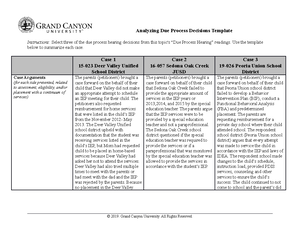- Information
- AI Chat
Was this document helpful?
SPD-300-T5-RS-Transition Goals
Course: Professional, Ethical and Legal Practices and Policies in Special Education (SPED-300)
212 Documents
Students shared 212 documents in this course
University: Grand Canyon University
Was this document helpful?

Transition Goals
Transition Goal
(Measurable goal)
Transition-Related Service
(Related to and supports
transition goal)
Activity
(Related to and supports
transition goal)
Education/Trainin
g
(i.e., vocational,
post-secondary
education, on-the-
job training,
apprenticeship, etc)
After high school, Gabriel will
enroll in a community college to
take up courses that will help him
improve his independent living
skills. These courses will include
social, employment training, and
basic life skills.
Once Gabriel completes high
school, he will have the
opportunity to attend programs
that will help him reach his goals.
The programs will focus on
resumes, cooking, cleaning, etc.
Gabriel will do a lot of volunteer
work at various places. This will
allow him to think about his future
career, learn to be a part of a
group, and take direction from
others.
Employment
(i.e., sheltered,
volunteer,
competitive, etc)
Gabriel will keep his job at the
grocery store. While he is great at
collecting carts, he will still need
to shadow the employee to learn
how to bag the groceries the
correct way.
Gabriel will participate in a
vocational rehabilitation program
to help with his skills. This will
allow him to learn more in a
smaller environment and decide
what he wants to do in the future.
Gabriel will take advantage of his
shadowing opportunity and the
vocational rehabilitation program.
By doing this he will gain new
experiences.
Independent
Living
(i.e., daily living
skills, leisure,
transportation,
access to adult
services, etc)
Gabriel will live with his family
and take on a few financial
responsibilities with the money he
saved from his job. This will help
him become more independent.
Gabriel will begin looking into a
few independent living places.
With help from a coordinator, he
will sit down and decide on what
options are best for him.
Gabriel will do assistant living on
weekend to get the feel of being
out of the house with his family.
This will prepare him to live alone
and apply his skills.
Rationale:
© 2019. Grand Canyon University. All Rights Reserved
Students also viewed
- Alicia Plaafp-SPED 300
- SPD-300-T4-RS-IEP Goals and Measuring Progress and Rationale Template (Auto Recovered)
- SPD-300-T5-RS-Transition Goals Template
- Special Education Law Video
- GC - SPD - 300 - Aug 16 - Week 1 - Amber Altman
- Free Appropriate Public Education (FAPE) and Least Restrictive Environment (LRE)














